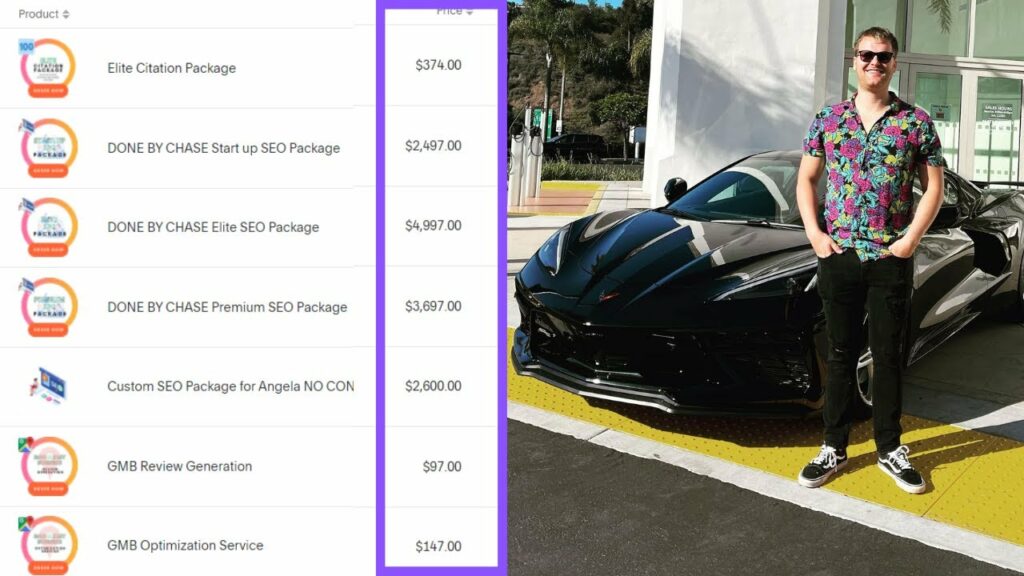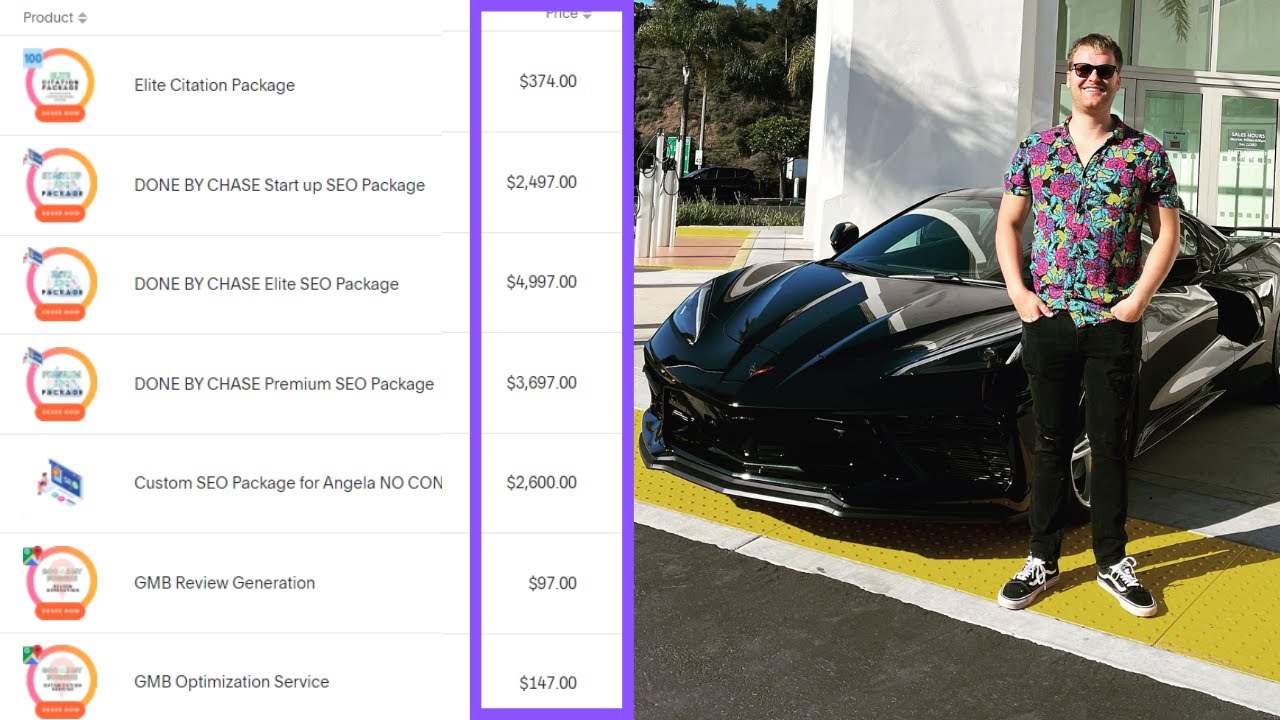How To Make Recurring Passive Income With SEO Clients (8 Easy Ways to Earn)
Hey there! In this article, “How To Make Recurring Passive Income With SEO Clients (8 Easy Ways to Earn),” we will be exploring different methods to make money with SEO clients. The video by Shinefy provides valuable insights on how to generate recurring passive income through various strategies. From offering SEO audits and on-page SEO services to charging for keyword research and selling citations, there are plenty of options to explore. You’ll also learn about ranking and renting websites, ranking and outsourcing, and selling conversion tracking services. So, let’s dive into these eight easy ways to earn and take your SEO game to the next level!

Making Money with SEO Audits
One of the easiest ways to make recurring passive income with SEO clients is by offering SEO audits. An SEO audit is a comprehensive analysis of a website to identify any issues that may be affecting its search engine ranking. By providing SEO audits, you can help clients understand what is wrong with their website and offer solutions to fix those issues.
To conduct an SEO audit, you can use tools like the Shine Ranker tool, which automates the audit process. However, if you prefer to do it manually, you can still achieve great results. Either way, the goal is to highlight areas that need improvement and offer your expertise in fixing those issues.
For instance, you can start by finding a website that is close to ranking number one on Google for a particular keyword. Let’s say you want to work with a chiropractor in Phoenix. You can search for chiropractors in Phoenix and select a website that is ranking on the bottom of the first page. Once you have found the website, you can use an SEO audit tool or manually go through the website to identify areas that need improvement.
During the audit, you may find issues like missing meta descriptions, non-optimized headings, lack of contact forms, or low word count. These are all areas that can be fixed to improve the website’s overall performance and search engine ranking. You can then provide the client with a detailed report highlighting the issues and offer your services to fix them.
The advantage of offering SEO audits is that it allows you to provide value upfront and establish a relationship with potential clients. By offering a free audit, you show the client that you are knowledgeable and can help them improve their website’s performance. This can potentially lead to more paid projects and recurring passive income.
Offering Solutions for Website Issues
Once you have conducted an SEO audit and identified website issues, the next step is to offer solutions to fix those issues. This is where your expertise in SEO comes into play.
For example, if you find that a website is missing meta descriptions or has non-optimized headings, you can offer to write compelling meta descriptions and optimize the headings to improve the website’s visibility in search engine results. You can also suggest adding contact forms or improving the word count on certain pages to make them more informative and valuable to visitors.
The key to offering solutions is to clearly explain why these changes are important and how they can benefit the client’s website. By showing your understanding of SEO best practices and providing actionable recommendations, you can build trust with the client and increase the likelihood of them hiring you for the job.
Remember, your goal is not only to fix the website’s issues but also to educate the client about the importance of proper SEO practices. This way, they will understand the value of investing in SEO services and be more likely to hire you for ongoing projects.
On-Page SEO Services
In addition to offering SEO audits, another way to make money with SEO clients is by providing on-page SEO services. On-page SEO refers to the optimization of individual web pages to improve their search engine ranking and visibility.
When it comes to on-page SEO, there are two main areas to focus on: improving website content and optimizing keywords.
Improving Website Content
High-quality website content is crucial for SEO success. It not only helps search engines understand what the page is about but also provides value to visitors. By improving website content, you can ensure that it is engaging, informative, and relevant to the target audience.
To improve website content, consider the following strategies:
-
Conduct keyword research: Identify relevant keywords that have high search volume and low competition. Incorporate these keywords naturally into the content to make it more SEO-friendly.
-
Write compelling titles and meta descriptions: Titles and meta descriptions are the first things that users see in search engine results. Craft compelling titles that entice users to click on the page, and write informative meta descriptions that accurately describe the content.
-
Optimize headings: Use HTML tags like H1, H2, and H3 to structure the content and make it easier for search engines to understand the hierarchy of information on the page. Include relevant keywords in the headings to improve SEO.
-
Improve readability: Use short paragraphs, bullet points, and subheadings to break up the text and make it easier for users to read. Consider using images, videos, or infographics to enhance the visual appeal of the content.
-
Update outdated content: Regularly review and update old content to keep it fresh and relevant. Remove any outdated information or broken links, and add new insights or examples to make the content more valuable.
By offering on-page SEO services, you can help clients optimize their website content and improve their search engine ranking. This can lead to increased organic traffic and better visibility for their business online.
Optimizing Keywords
Keyword optimization is a vital aspect of on-page SEO. By identifying and targeting the right keywords, you can increase the chances of your client’s website ranking higher in search engine results.
To optimize keywords, consider the following strategies:
-
Conduct keyword research: Use keyword research tools like Google Keyword Planner or SEMrush to identify relevant keywords for your client’s business. Look for keywords with high search volume and low competition.
-
Incorporate keywords into content: Once you have identified the relevant keywords, strategically incorporate them into the website content. This includes titles, headings, body text, meta descriptions, and image alt tags. However, be careful not to overuse keywords, as this can be seen as spammy by search engines.
-
Optimize URL structure: Ensure that the URLs for each page contain relevant keywords. Use dashes (-) to separate words and make the URLs more readable for both search engines and users.
-
Use internal and external links: Linking relevant content within the website (internal links) and to other authoritative websites (external links) can improve the website’s SEO. This shows search engines that the content is valuable and trustworthy.
-
Monitor keyword performance: Regularly monitor how the targeted keywords are performing in search engine results. Make adjustments as needed based on the data and feedback from clients.
By offering keyword optimization services, you can help clients improve their website’s visibility in search engine results and attract more organic traffic. This can ultimately lead to increased conversions and revenue for their business.
Charging for SEO Keyword Research
Keyword research is a vital component of any successful SEO strategy. It involves identifying the right keywords to target to increase a website’s visibility in organic search results. By offering keyword research services, you can help clients find profitable keywords and improve their search engine ranking.
Finding Profitable Keywords
The first step in offering keyword research services is to identify profitable keywords for your clients. These are keywords that have high search volume and low competition.
To find profitable keywords, consider the following strategies:
-
Use keyword research tools: Tools like Google Keyword Planner, SEMrush, or Ahrefs can provide valuable insights into search volume, competition, and related keywords. Use these tools to generate a list of potential keywords for your clients.
-
Analyze competitors: Take a look at what keywords competitors are targeting and ranking for. This can help you identify gaps in the market and find unique keywords that your clients can target.
-
Consider long-tail keywords: Long-tail keywords are longer and more specific keyword phrases that typically have lower search volume but higher conversion rates. They are often less competitive and can be easier to rank for.
-
Take user intent into account: Consider the intent behind certain keywords. Are users looking for information, products, or local services? Tailor your keyword research to align with user intent and help clients reach their target audience.
-
Use location-based keywords: If your client’s business is location-dependent, focus on including location-based keywords in your research. This can help the website rank higher for local searches.
Providing Keyword Analysis
Once you have identified profitable keywords, the next step is to provide your clients with a detailed analysis of these keywords. This analysis should include information on search volume, competition level, and potential ranking opportunities.
By providing keyword analysis, you can help clients understand the value of targeting specific keywords and how it can impact their website’s visibility in search engine results. This analysis can also serve as a roadmap for their SEO strategy moving forward.
When charging for keyword research services, consider offering different packages based on the number of keywords analyzed or the level of detail provided in the analysis. This way, clients can choose the option that best fits their needs and budget.
By offering keyword research services, you can position yourself as an expert in SEO and provide clients with valuable insights to improve their website’s visibility. This can lead to long-term partnerships and recurring passive income.
Ranking and Renting Websites
Ranking and renting your own website is another way to make recurring passive income with SEO clients. This method involves creating a website, ranking it in search engine results, and then renting it out to clients who want to increase their online presence.
Building and Ranking Your Own Website
The first step in ranking and renting websites is to create your own website in a niche that has high demand and low competition. This could be anything from a local service-based business to an e-commerce store.
When building your website, consider the following factors:
-
Niche selection: Choose a niche that you are knowledgeable about and passionate about. It’s important to select a niche with enough demand to attract potential clients.
-
Domain selection: Choose a domain name that is relevant to your niche and easy to remember. Consider using keywords in the domain, as this can help with SEO.
-
Content creation: Create high-quality, informative, and engaging content for your website. This includes blog posts, product descriptions, and landing pages. Remember to incorporate SEO best practices, such as optimizing keywords and headings.
-
SEO optimization: Optimize your website for SEO by focusing on on-page factors like meta tags, URL structure, and image alt tags. Also, consider off-page factors like building high-quality backlinks and promoting your website through social media and other channels.
Once your website is live, the next step is to focus on ranking it in search engine results. This involves implementing various SEO strategies to improve its visibility and organic traffic.
Renting Your Website to Clients
Once your website is ranking in search engine results and generating organic traffic, you can start renting it out to clients who want to increase their online presence. This can be done through various means, such as offering advertising space, lead generation, or direct promotion of their products or services.
When renting your website to clients, consider the following strategies:
-
Offer advertising space: If your website attracts a significant amount of traffic, you can sell advertising space to other businesses within your niche. This can be done through banner ads, sponsored content, or affiliate marketing.
-
Generate leads: If your website targets a specific audience, you can offer lead generation services to clients. This involves collecting contact information from interested visitors and providing it to your clients in exchange for a fee.
-
Promote products or services: If your website aligns with a particular product or service, you can promote it directly to your audience. This can be done through product reviews, sponsored content, or special offers.
-
Build a network: Establish relationships with other businesses within your niche and offer partnerships or collaborations. By working together, you can leverage each other’s audiences and create mutually beneficial opportunities.
Renting your website to clients not only provides them with increased online visibility but also allows you to generate recurring passive income. This method can be a win-win situation for both you and your clients, as they benefit from your website’s established authority and you benefit from the rental fees.
Ranking and Outsourcing
Ranking and outsourcing SEO services is another way to make recurring passive income with SEO clients. This method involves ranking websites using SEO strategies and then outsourcing the actual SEO work to other professionals or agencies.
Outsourcing SEO Services
Outsourcing SEO services allows you to focus on the business side of acquiring clients and managing relationships while delegating the actual SEO work to others. This can free up your time and resources, allowing you to scale your business and serve more clients.
When outsourcing SEO services, consider the following steps:
-
Find reliable professionals or agencies: Look for reputable professionals or agencies with a track record of delivering high-quality SEO work. Consider their experience, expertise, and client testimonials.
-
Define the scope of work: Clearly define the tasks and responsibilities you want to outsource. This could include keyword research, content creation, link building, or technical SEO. Provide detailed guidelines and expectations to ensure that the work is done to your standards.
-
Set clear communication channels: Establish clear communication channels with the professionals or agencies you are outsourcing to. Regularly communicate with them to provide updates, answer questions, and provide feedback.
-
Monitor progress and results: Regularly monitor and evaluate the progress and results of the outsourced SEO work. Ensure that the work is aligned with your SEO strategy and meets the client’s expectations.
By outsourcing SEO services, you can focus on the business aspects of working with clients, such as acquiring new clients, managing relationships, and providing strategic guidance. This allows you to generate recurring passive income without getting involved in the day-to-day SEO work.
Selling Outsourced SEO Services to Clients
Once you have outsourced the SEO work to professionals or agencies, you can sell these services to your clients. Position yourself as a middleman who manages and oversees the SEO work while providing clients with the desired results.
When selling outsourced SEO services to clients, consider the following strategies:
-
Establish trust and credibility: Build a reputation as a trusted and reliable SEO service provider. Highlight your expertise, experience, and past successes to establish credibility with clients.
-
Clearly communicate your role: Be transparent with clients about your role as a middleman who oversees the outsourced SEO work. Explain the benefits of working with you, such as having a single point of contact and access to a network of skilled professionals.
-
Provide regular updates and reports: Keep clients informed about the progress of their SEO campaigns. Provide regular updates and reports that show the work being done, the results achieved, and any recommendations for improvement.
-
Offer additional value-added services: In addition to outsourced SEO services, consider offering additional value-added services to clients. This could include website audits, competitor analysis, or content creation.
By selling outsourced SEO services to clients, you can make recurring passive income while ensuring that clients receive high-quality SEO work. This business model allows you to leverage the expertise of others while focusing on building and managing client relationships.
Ranking and Selling Websites
Ranking and selling websites is another lucrative strategy to make recurring passive income with SEO clients. This method involves building, ranking, and then selling websites to interested buyers.
Building and Ranking Websites
The first step in ranking and selling websites is to identify a profitable niche and build a website around it. This involves selecting a niche with high demand and low competition, as well as creating high-quality content that targets relevant keywords.
When building and ranking websites, consider the following strategies:
-
Keyword research: Identify profitable keywords that align with the niche you have chosen. Look for keywords with high search volume and low competition.
-
Domain selection: Choose a domain name that is relevant to your niche and easy to remember. Consider using keywords in the domain to improve SEO.
-
Content creation: Create high-quality and informative content that targets the chosen keywords. Optimize the content for SEO by incorporating keywords naturally and ensuring proper HTML tags are used.
-
On-page optimization: Optimize the website’s on-page elements, such as meta tags, URL structure, and image alt tags. Ensure that the website is user-friendly, loads quickly, and is mobile-responsive.
-
Off-page optimization: Focus on building high-quality backlinks from relevant and authoritative websites. This can be done through guest posting, outreach campaigns, or social media promotion.
By following these strategies, you can increase the website’s visibility in search engine results and attract organic traffic. This, in turn, increases the website’s value and makes it more attractive to potential buyers.
Selling Websites for Profit
Once you have successfully ranked a website and it is generating organic traffic, you can sell it to interested buyers. There are various platforms and marketplaces where you can list and sell websites, such as Flippa or Empire Flippers.
When selling a website, consider the following factors:
-
Valuation: Determine the value of the website based on its organic traffic, revenue, and other relevant metrics. Consider factors like domain authority, backlink profile, and niche demand.
-
Listing presentation: Present the website in a professional and appealing manner to potential buyers. Include detailed information about the website’s niche, traffic sources, revenue streams, and growth potential.
-
Pricing strategy: Set a realistic price that reflects the website’s value and potential. Consider any additional assets or intellectual property that may add value to the sale.
-
negotiate the sale: Be prepared to negotiate with potential buyers to reach a mutually beneficial agreement. Consider factors like payment terms, post-sale support, and any non-compete clauses.
By successfully selling websites, you can generate substantial profits and establish a reputation as a skilled website builder and marketer. This allows you to make recurring passive income and potentially scale your business by building and selling multiple websites.
Selling Citations
Selling local citations is another viable option to make recurring passive income with SEO clients. A citation is a reference to a business’s name, address, and phone number (NAP) on other websites, directories, or platforms. Selling local citations involves creating and selling these references to businesses looking to improve their local SEO.
Creating Local Citations for Businesses
To sell local citations, you need to understand the importance of local SEO and how citations contribute to a business’s online presence. Local SEO is the process of optimizing a website to rank higher in location-based search results, such as “coffee shops near me” or “plumbers in New York City.”
When creating local citations, consider the following strategies:
-
Conduct research: Identify relevant directories, platforms, or websites where local citations can be created. Focus on platforms that are specific to the business’s industry or location.
-
Gather accurate business information: Collect the business’s NAP (name, address, and phone number), website URL, and other pertinent information. Ensure that this information is consistent across all citations to avoid confusing search engines and potential customers.
-
Create citations: Submit the business’s information to the identified directories or platforms. Follow the guidelines provided by each platform to ensure that the citation is created correctly.
-
Monitor and update citations: Regularly monitor the created citations to ensure that the information is accurate and up to date. Update any outdated or incorrect information as necessary.
By creating local citations for businesses, you can help them establish a stronger online presence and improve their visibility in location-based search results. This can result in more website traffic, leads, and customers for the business.
Selling Local Citations to Businesses
Once you have created local citations for various businesses, you can sell these citations to other businesses within the same industry or location. This allows you to generate recurring passive income while helping other businesses improve their local SEO.
When selling local citations, consider the following strategies:
-
Establish credibility and expertise: Position yourself as an expert in local SEO and emphasize your knowledge and experience in helping businesses improve their online presence. Highlight any success stories or testimonials from previous clients.
-
Identify potential clients: Identify businesses that could benefit from local citations based on their industry, location, or target audience. Consider reaching out to them directly or promoting your citation services through various channels.
-
Offer customized citation packages: Create different packages based on the number of citations included or the level of customization provided. Tailor these packages to meet the specific needs and budgets of potential clients.
-
Provide ongoing support: Offer ongoing support and maintenance for the created citations. Regularly monitor the citations and update them as needed to ensure accuracy and consistency.
By selling local citations, you can leverage your expertise in local SEO and capitalize on the growing demand for businesses to establish a strong online presence. This can result in recurring passive income, satisfied clients, and potential referrals.
Offering Conversion Tracking
Offering conversion tracking services is another valuable way to make recurring passive income with SEO clients. Conversion tracking involves setting up analytics tools and tracking codes on clients’ websites to monitor and measure conversions, such as form submissions, purchases, or other desired actions.
Setting up Analytics for Clients
The first step in offering conversion tracking services is setting up analytics tools, such as Google Analytics, on your clients’ websites. Analytics tools provide valuable insights into website performance, visitor behavior, and conversion rates.
When setting up analytics for clients, consider the following steps:
-
Create an analytics account: Set up an account with the analytics tool of your choice. For example, create a Google Analytics account if you are using that tool.
-
Generate tracking code: Once the account is set up, generate a tracking code or tracking ID. This code needs to be added to the client’s website to track visitor behavior and conversions.
-
Install tracking code: Add the tracking code to the client’s website by inserting it into the appropriate section of the website’s code. This can typically be done by modifying the website’s header or footer.
-
Set up goals: Define the conversion actions that need to be tracked, such as form submissions, purchases, or newsletter subscriptions. Create goals within the analytics tool to track these actions and measure their effectiveness.
Once the analytics tool is set up on the client’s website, you can start tracking and monitoring conversions. This allows you to provide valuable insights to clients and help them optimize their website’s performance.
Helping Clients Track Website Performance
In addition to setting up analytics tools, you can help clients track and monitor their website’s performance. This involves analyzing data, providing reports, and offering recommendations to improve conversion rates and overall website performance.
When helping clients track website performance, consider the following strategies:
-
Analyze data: Regularly analyze the data collected by the analytics tool to identify trends, patterns, and areas for improvement. Look for pages with high bounce rates, sources of traffic with low conversion rates, or any other insights that could indicate opportunities for optimization.
-
Provide reports: Create customized reports for clients, highlighting key performance indicators (KPIs), conversion rates, and any other relevant metrics. Clearly explain the data and provide actionable recommendations based on the insights gained.
-
Offer optimization recommendations: Based on the data and insights, provide clients with actionable recommendations to improve their website’s performance. This could involve redesigning landing pages, optimizing call-to-action buttons, or improving website load times.
-
Monitor and iterate: Continuously monitor the website’s performance and iterate on the optimization strategies as needed. Track the impact of any changes made and fine-tune the conversion tracking setup to ensure accurate data collection.
By offering conversion tracking services, you can help clients understand the effectiveness of their website and digital marketing efforts. This not only provides valuable insights but also positions you as a valuable partner in their business success.
Other Passive Income Opportunities
In addition to the strategies mentioned above, there are other passive income opportunities available to SEO professionals. These opportunities allow you to leverage your knowledge and expertise to generate recurring income.
Affiliate Marketing with SEO
Affiliate marketing involves promoting products or services through your website or other online channels and earning a commission for every sale or conversion generated. By leveraging your SEO skills, you can attract targeted traffic to affiliate offers and earn passive income.
To succeed in affiliate marketing with SEO, consider the following tips:
-
Identify profitable affiliate products: Research and identify affiliate products or services that align with your niche and have the potential to generate significant commissions.
-
Create valuable content: Develop high-quality and informative content that incorporates your affiliate links naturally. This could include product reviews, comparison articles, or tutorials.
-
Optimize for SEO: Use keyword research and on-page SEO techniques to optimize your content for search engines. Focus on targeting keywords that have high search volume and low competition.
-
Build an audience: Grow your website’s audience or following through content marketing, social media, and email marketing. Engage with your audience and provide value to build trust and loyalty.
-
Track and optimize conversions: Use analytics tools and conversion tracking to monitor the performance of your affiliate campaigns. Track which traffic sources, keywords, or content types generate the most conversions and optimize accordingly.
Affiliate marketing with SEO can be a highly profitable and passive income stream if done correctly. By consistently creating valuable content and driving targeted traffic to affiliate offers, you can earn commissions while providing value to your audience.
Creating and Selling SEO Courses
If you have extensive knowledge and experience in SEO, creating and selling online courses can be a lucrative passive income opportunity. By packaging your expertise into a course format, you can reach a broader audience and generate recurring income from course sales.
When creating and selling SEO courses, consider the following steps:
-
Define your course topic: Identify a specific aspect of SEO that you excel in and can teach effectively. This could be keyword research, on-page optimization, link building, or advanced SEO strategies.
-
Plan your course structure: Outline the modules, lessons, and learning objectives of your course. Break down the content into digestible and logical units to ensure a smooth learning experience for students.
-
Develop course materials: Create engaging and informative course materials, such as video lessons, slideshows, quizzes, and workbooks. Ensure that the content is well-structured, easy to understand, and provides actionable takeaways.
-
Choose a course platform: Select an online course platform that suits your needs and budget. There are various platforms available, such as Teachable, Udemy, or Thinkific, that provide tools for course creation, delivery, and sales.
-
Market and promote your course: Develop a marketing strategy to promote your course to your target audience. This could include content marketing, social media promotion, email marketing, or collaborations with other industry experts.
By creating and selling SEO courses, you can leverage your expertise to help others learn and grow their SEO skills. This not only generates recurring income but also establishes you as a thought leader and authority in the industry.
Conclusion
In conclusion, there are many ways to make recurring passive income with SEO clients. By offering SEO audits, on-page SEO services, and keyword research, you can help clients improve their website’s performance and achieve better search engine rankings. Additionally, ranking and renting websites, ranking and outsourcing SEO services, and selling websites provide opportunities to generate passive income. Other passive income opportunities, such as selling citations, offering conversion tracking, affiliate marketing, and creating and selling SEO courses, can further enhance your income streams. By leveraging your SEO skills and providing value to clients, you can establish a successful and profitable business in the SEO industry.
EXTREMELY LIMITED: Rare Opportunity To Make Your SEO Passive Will Be Promptly Removed After 25 Sales:
-
Make Money With SEO Audits Learn how to earn recurring passive income by offering SEO audit services to clients.
-
Make Money With On-Page SEO Services Discover the techniques to capitalize on providing on-page SEO services and generate steady income.
-
Charge for SEO Keyword Research Learn how to monetize your SEO skills by providing valuable keyword research services to clients.
-
Rank and Rent Your Website Explore the strategy of ranking your website and renting it out to other businesses for a passive income stream.
-
Rank and Outsource (You’re Your Own Client) Uncover the benefits of ranking your own website and outsourcing the work to create a sustainable passive income source.
-
Rank and Sell Your Website Discover how to rank your website and then sell it for a profitable return on your investment.
-
Sell Citations Learn how to monetize citations by offering them as a service to clients and earn recurring passive income.
-
Sell Conversion Tracking (Analytics Setup) Explore the opportunity to generate passive income by selling conversion tracking services through analytics setup.
[00:00:00] – Intro
[00:01:12] – Making money with SEO audits
[00:04:41] – Making money with On-Page SEO
[00:08:14] – Go over copyscape
[00:09:07] – Full master class
[00:09:35] – Charging for keyword research
[00:12:44] – Ranking and renting your own website
[00:14:51] – Rank and outsource
[00:16:10] – Rank and selling
[00:17:25] – Sell citations
[00:18:02] – What is a citation?
[00:18:36] – Selling conversion tracking in analytics
[00:20:33] – Outro









